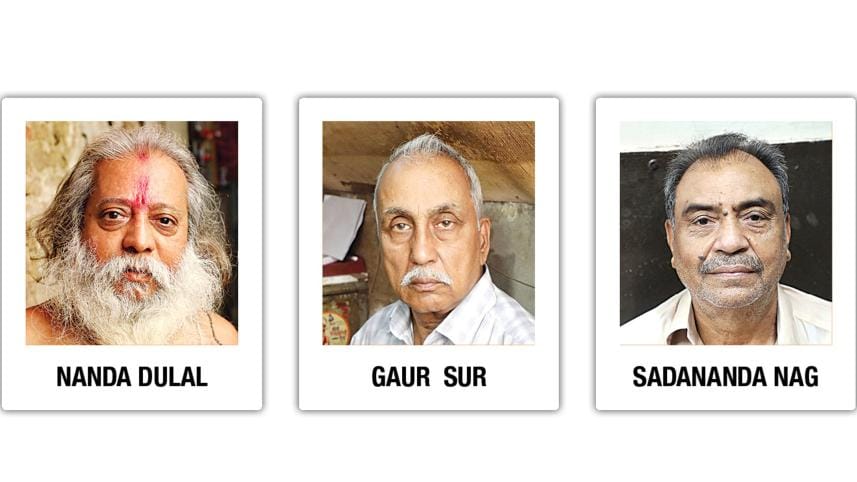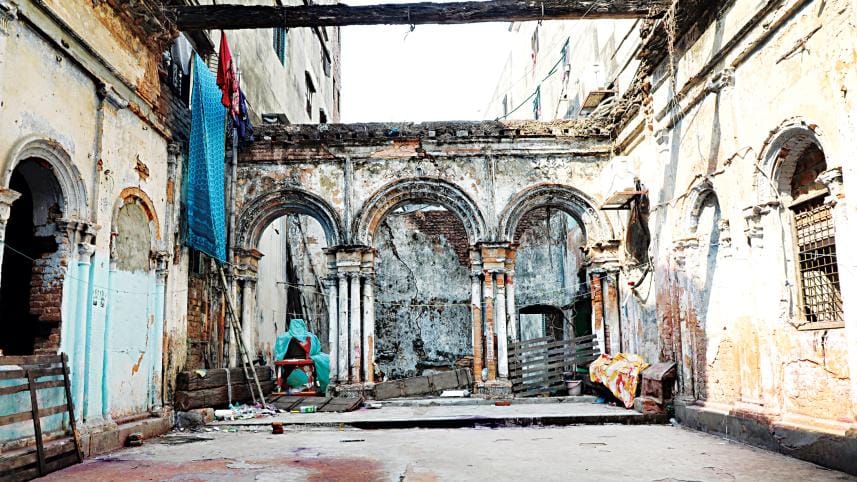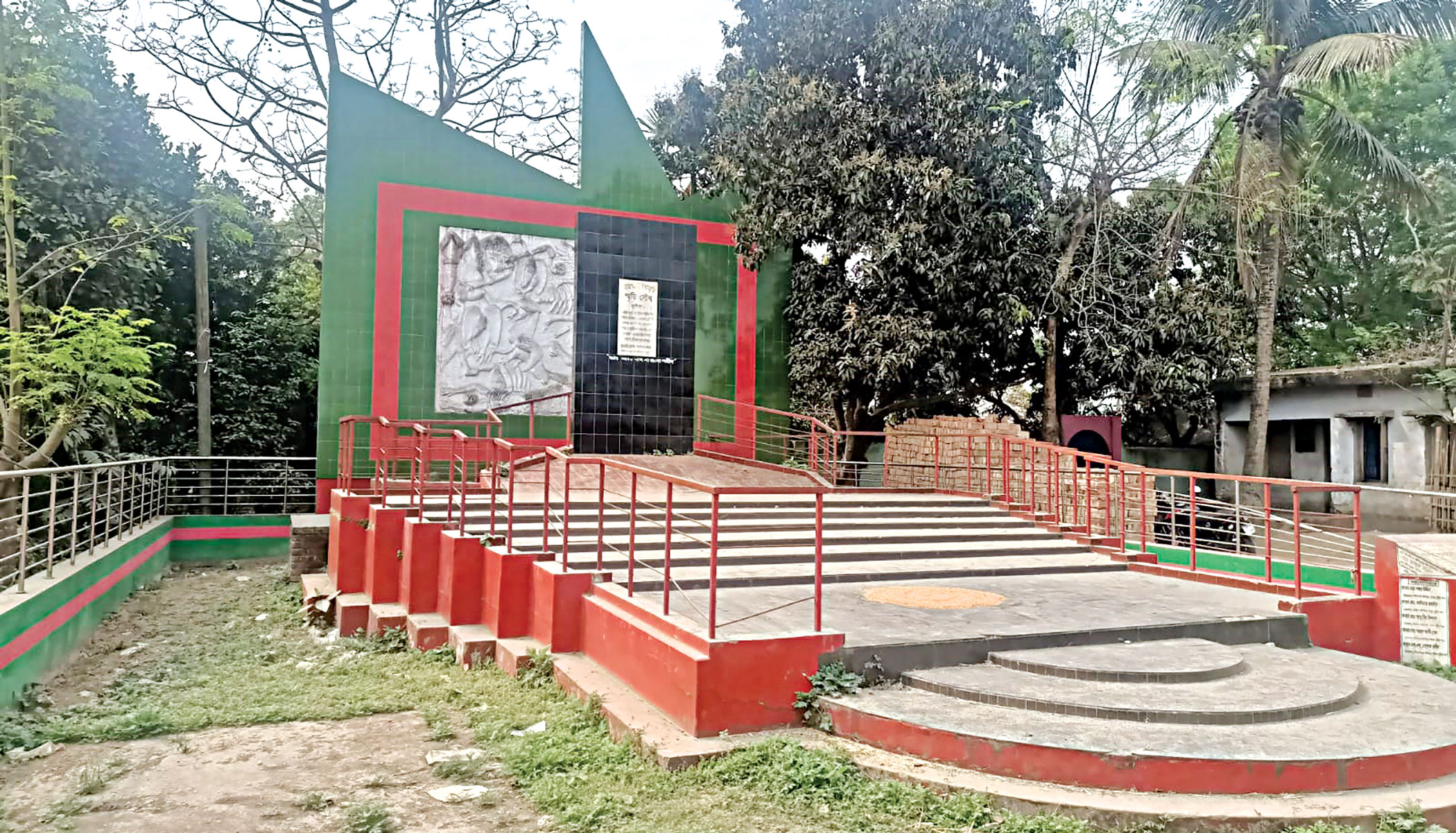Shankhari Bazar carnage ‘71: Death knocked on their doors at sundown

Shankhari Bazar is a neighbourhood in the old part of Dhaka, largely inhabited by the Hindus.
The area is named after the Shankhari community whose ancestral profession is to produce hand-crafted conch shell bangles known as shankha, and various other types of jewellery mostly worn by Hindu women and used for decorating the statues of their deities.
On the night of March 25, 1971, the Pakistan army launched Operation Searchlight and attacked areas deemed as the centres of the Bangalee nationalist movement.
The Hindu-dominated neighbourhoods of Old Dhaka were particularly targeted by the occupation force as they were considered pro-Awami League bastions.
Nanda Dulal Brahmachari, locally known as Dulal Sadhu, was then 19. He is one of the survivors of the massacre that befell Shankhari Bazar.
"In the election of 1970, we the inhabitants of Shankhari Bazar unanimously voted for the Awami League," recalled Dulal.
"It was one of the major reasons why Syed Khwaja Khairuddin of Dhaka's Nawab family got defeated in the election. So, he branded all of us as anti-Pakistan and invited the army to take retaliatory measures against us."
In the early hours of March 26, the Pakistan army started the systematic destruction of the neighbourhood. The soldiers started to fire arbitrarily at the doors and windows of the houses on both sides of the lane where Dulal Sadhu's family lived.
"We guessed what might happen to us, so we took shelter deep inside our two-storey home. However, one of the stray bullets hit our servant Harihar, a 10-year-old boy, who died instantly," he said.
The rest of the residents of the house, including Dulal, managed to escape later.
The soldiers also threw grenades and firebombs through the windows inside several houses, killing the inhabitants and setting fire to a large part of the locality, he recounted.
"Through the bullet holes, I tried to observe whether soldiers were going to set fire to our house. Then I saw that a team of five soldiers took position in front of a house just opposite ours. It was owned by the Saha family."
One of the soldiers smashed the door of that house by spraying it with machine gun shots and two other soldiers threw bombs inside. With massive explosions, the ground floor collapsed instantly and the house was ignited.

"The soldiers also fired at the burning wreck. I heard heart-wrenching screams and shrieks with the rattling of machine guns. All of the inhabitants of that house were killed by gunshots or were burnt alive," said Dulal Sadhu, narrating the horror.
Just a few metres away from Saha's house was the residence of renowned physician Nishikumar Nag. His son Sadananda Nag, who was in his early 20s then, shared his traumatic experience of how he witnessed his father's murder.
"We were horrified when soldiers started banging on our door. They were shouting and calling my father," said Sadananda.
"My father was a renowned physician and he was fluent in Urdu and English. He opened the door. As he tried to explain to the soldiers something in Urdu, one of the soldiers punched him and kicked him, and he fell to the floor.
"Pakistani soldiers surrounded the entire Shankhari Bazar neighbourhood in the evening before starting the raid. We were getting deafening sounds of explosions and gunfire from the nearby areas. Rattling sounds of burning wrecks and screams of the victims pierced through our ears. We were trembling and awaiting our fate like a mouse caught in the trap."
Sadananda was watching it through a window blind and trying to calm his mother and siblings. The soldiers searched for him and other family members but could not find them as they were hiding in a secret storeroom.
Failing to catch them, the soldiers vandalised the entire house. They tortured Dr Nag to make him reveal the hiding place of his family members. He did not utter a word.
"Suddenly two of the soldiers held my father and made him stand up and another soldier charged a bayonet right into his abdomen. He charged the bayonet again into the chest of my father. Seeing the horror, we left our house through the backdoor."
Another group of soldiers attacked the temples of the neighbourhood and completely demolished them. Many of the priests had already fled. However, the army identified those who could not flee by their shaved head, clothing and pigtail.
Around 20 of them were crammed into a room and a soldier fired his machine gun at the crowd, finishing off all of them. Another soldier shot from his pistol at those who seemed still alive.
This terrifying scene was witnessed by Gaur Sur, whose 30 family members were killed in the massacre.
He said, "The Sur family was one of the wealthiest and most influential families in the neighbourhood. While the soldiers were destroying the temple, one of the officers of the Pakistan army told my uncle Chandan Sur and his brothers and sons to come down [ from the first floor of the house] and talk to their senior officer.
"The officer assured us that they would not harm us at all and they only wanted to talk to my uncle. However, whenever Chandan and his brothers went down, they were killed instantly by machine gun fire. Then my brothers and cousins were also picked up from our home, lined up on the street and gunned down. Only a few lucky ones like me saved lives by hiding in the sewerage line.
"Pakistani soldiers also kidnapped many women from the neighbourhood, who could never be found."
Dulal Sadhu, Sadananda Nag and Gaur Sur are three of the last survivors of the carnage, still alive and still living in the area. Most of the witnesses of the horrific incident that took place 53 years ago either passed away or left the country.
Sadananda, who now runs a shankha store in the area, never could get over the trauma.
"I could never forgive myself for not doing anything to save my father. I had to endure that nightmare just to save my mother and my younger siblings. Still, in my sleep, I can hear my father's scream and yelling of Pakistani soldiers," he said.
The carnage continued till March 28 and by that time, the entire Shankhari Bazar was abandoned. At least 212 Hindus were confirmed dead and many more went missing and they could never be found.
Gaur Sur said, "When we fled to India, many people who sheltered us told us not to return to Bangladesh. They said we would not be able to live harmoniously with the Muslims.
"However, we did not pay heed to them. We have been living here since the Mughal period. This is my ancestral land. I want to live here till my last breath."




 For all latest news, follow The Daily Star's Google News channel.
For all latest news, follow The Daily Star's Google News channel. 
Comments